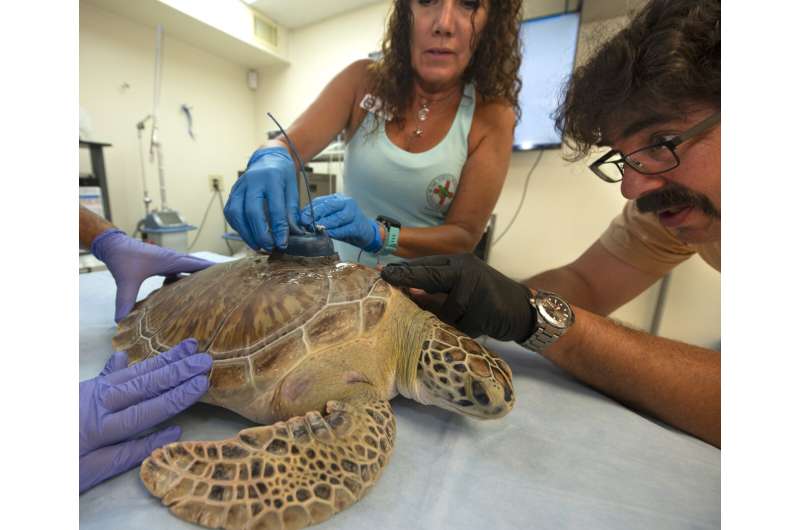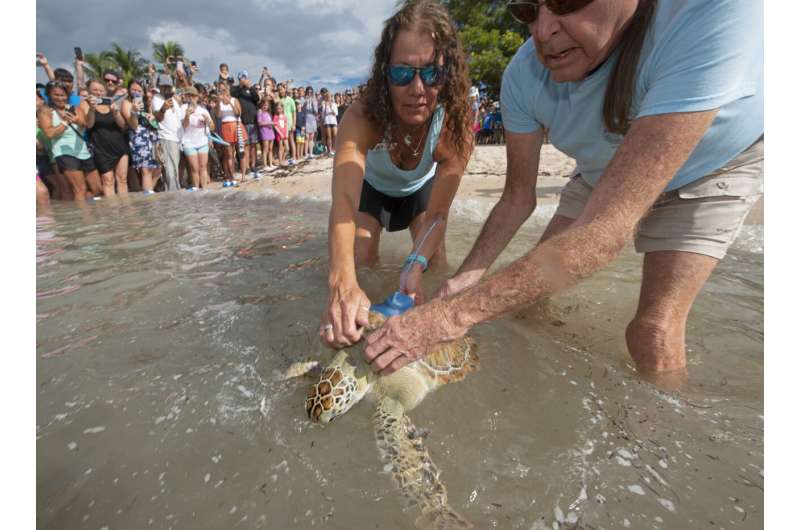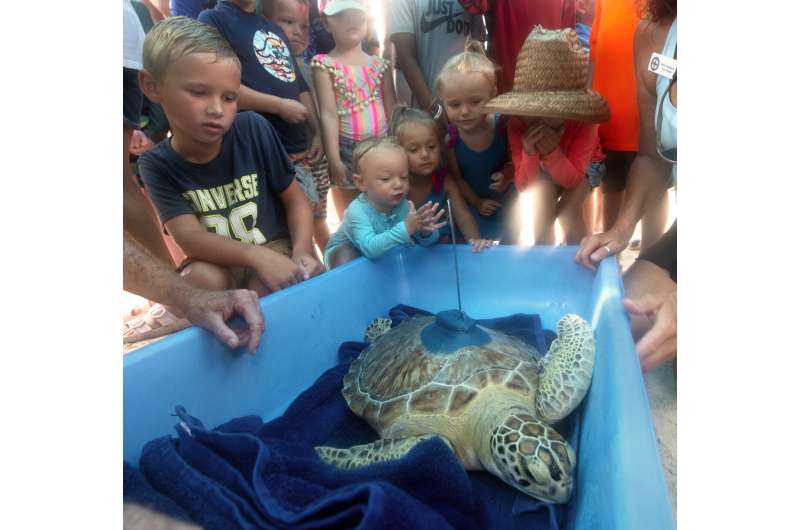In this photo provided by the Florida Keys News Bureau, Bette Zirkelbach, left, manager of the Florida Keys-based Turtle Hospital, and Dan Evans, right, senior biologist of the Sea Turtle Conservancy, finish affixing a satellite tracking receiver to "Tortie," a juvenile green sea turtle on Friday, July 15, 2022, in Marathon, Fla. The reptile was found Dec. 1, 2021, unable to dive and afflicted with fibropapillomatosis -- a tumor-causing disease that develops from a herpes-like virus affecting sea turtles globally. After being treated at the hospital, "Tortie" is to be released later Friday morning to join the 15th annual Tour de Turtles, an online "race" that is to follow a dozen released turtles for three months. Credit: Andy Newman/Florida Keys News Bureau via AP
A juvenile green sea turtle that underwent multiple surgeries to remove cauliflower-like tumors was released last week off the Florida Keys with a satellite-tracking transmitter.
"Tortie" was treated at the Keys-based Turtle Hospital after being rescued last December. The turtle was unable to dive and suffering from fibropapillomatosis—a debilitating tumor-causing disease that develops from a herpes-like virus that affects sea turtle species around the world.
After Tortie's tumors were removed, the reptile's treatment included antibiotics, fluids, vitamins and a diet of mixed seafood and greens.
The turtle's satellite tracker will be monitored as part of the 15th annual Tour de Turtles, an online "race" organized by the Sea Turtle Conservancy that follows the long-distance migration of a contingent of sea turtles over three months.
"In addition to the educational aspect of the Tour de Turtles, we're also learning about where these turtles are going and then can look and see if there are any threats that the turtles face in these areas," said Dan Evans, senior research biologist with the conservancy.
Tortie, who was released Friday, is competing in the hard-shell turtles' division that features about a dozen contestants, with tracking to begin Aug. 1.
"One sea turtle can make a difference, not only going back to the ocean and having baby sea turtles, but the bigger reach is helping people to care about sea turtles and our oceans," said Bette Zirkelbach, the hospital's general manager.
-
In this photo provided by the Florida Keys News Bureau, Bette Zirkelbach, left, and Richie Moretti, right, of the Florida Keys-based Turtle Hospital, release "Tortie," a juvenile green sea turtle, Friday, July 15, 2022, in Marathon, Fla. The reptile was found Dec. 1, 2021, unable to dive and afflicted with fibropapillomatosis -- a tumor-causing disease that develops from a herpes-like virus affecting sea turtles globally. After being treated at the hospital, "Tortie" was released to join the 15th annual Tour de Turtles, an online "race" that is to follow a dozen released turtles for three months. Credit: Andy Newman/Florida Keys News Bureau via AP
-
In this photo provided by the Florida Keys News Bureau, children observe "Tortie," a juvenile green sea turtle, just before the reptile was released off the Florida Keys Friday, July 15, 2022, in Marathon, Fla. She was found Dec. 1, 2021, unable to dive and afflicted with fibropapillomatosis -- a tumor-causing disease that develops from a herpes-like virus affecting sea turtles globally. After being treated at the Keys-based Turtle Hospital, "Tortie" was placed into the Atlantic Ocean and is to be part of the 15th annual Tour de Turtles, an online "race" that is to follow a dozen released turtles for three months. Credit: Andy Newman/Florida Keys News Bureau via AP
© 2022 The Associated Press. All rights reserved. This material may not be published, broadcast, rewritten or redistributed without permission.

























